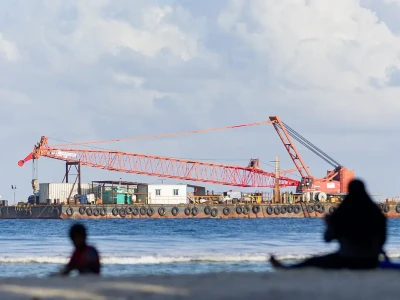
Tax hike alone not enough, urgent cost cuts needed: World Bank
According to the World Bank, inflation in the Maldives, which is currently at 4%, is expected to rise to 5.7% this year.
By
Ahmed Naif
The Maldives’ economy cannot overcome domestic and external shocks its is facing by increasing GST and TGST alone, and urgent steps should be taken to reduce government expenditure, the World Bank said on Sunday.
The World Bank together with the Maldives National University (MNU) held a presentation and panel discussion on Sunday to discuss the latest issue of the Washington-based development bank's Maldives Development Update report. The bi-annual report states that the country's tourism has recovered to pre-Covid levels, resulting in an increase in national productivity or GDP and reducing the percentage of the poor. As a result, the country's debt as a percentage of GDP has been reduced to 106%, the report said.
However, the World Bank also identified high debt levels as a significant challenge to the Maldives in the medium term. The bank's report pointed out:
-
The biggest risk is that the debt swells to USD 2.5 billion with guaranteed loans to state-owned firms and capital; that is 45% of GDP
-
Currently, the country has to spend USD 393 million annually for debt repayment and the country will have to pay USD 1 billion in 2026 alone
-
With mounting debt and challenges in refinancing the debt, the impact of internal and external shocks to the country's economy will be immense
-
The situation in the country will become fragile if the government takes heavy loans in business terms to meet its expenses
"Fiscal policy needs to be changed very quickly. While the increase in GST and TGST is a good move, it is not enough to bring the country's finances back to order. We need to make fiscal adjustments to reduce expenditure. Expenditure rationalising measures need to be taken urgently," said Erdem Atas, the World Bank Country Economic and Resident Coordinator, in his presentation.
Central bank financing major concern
The World Bank report pointed out that as government spending continues to grow year-on-year without any reductions, the need for the central bank, MMA and private banks to finance the budget deficit has increased. The report says:
-
The government's debt to MMA is 47% of the bank's capital
-
Debt to domestic banks has risen to MVR 26.4 billion or 30% of GDP
The report noted that as a result of this trend, banks have started reducing lending to private enterprises. A large part of the money available for lending in banks is being used to lend to the government.
According to the report, the government's year-on-year borrowings to meet the budget deficit have contributed to interest payments reaching to 3.4% of the GDP. According to the figures in the report, it is MVR 3.2 billion a year.
Reforms to subsidies and infrastructure policy needed
One of the World Bank's main recommendation in the report to reduce government spending to take the country's finances to a sustainable level is to enact subsidy reforms to target them instead of existing blanket subsidies. It is suggested that food, electricity and Aasandha subsidies should be reformed into aid given to the needy only. In addition:
-
Formulate a robust policy for infrastructure projects and rationalise these expenditures
-
Formulate prudent debt management regulations
-
Reduce funding to SOEs, improve governance of SOEs and increase the role of Privatisation and Corporatisation Board (PCB)
-
Make the tax system more efficient and ensure that tax collection is done properly
Erdem said the Maldives economy is expected to grow at 6.6% this year and 5.6% next year. He, however, said the Maldives should think of sustaining the growth. Erdem believes that growth can be sustained only when efforts are underway to address the current challenges to the economy.
He, however, expressed concern over the non-implementation of the proposed subsidy reforms in this year's budget. He also said that it was a matter of concern that non-concessional loans were being taken for infrastructure projects.
"There are projects under the 2019 development plan. But they need to be revised with the changes that are taking place in the global economy right now. We need to be very careful about the fact that if we take loans from foreign countries under heavy terms and execute the project right now, it will be burdensome," Erdem said.
"Now, by borrowing and increasing investment, economic growth can be raised to double digits as well. But if the growth for the next five years is at 2%, it is meaningless. Keeping it at 5-6% in medium-term growth seems to be a sustainable path."
The report pointed out that the heavy imports required for infrastructure projects would lead to a widening current account deficit and adversely affect foreign exchange reserves and the state's finances. The report pointed out that the reserves of USD 796 million were enough for 2.8 months of imports. The report pointed out that the reserves could have been improved due to currency swaps with India's central bank.
Taking note of these concerns, the report said that the presence of reserves at that level is a matter of concern as global commodity prices continue to rise.
Rising commodity prices will be challenging
Another challenge for the Maldives' economy this year, as the World Bank report points out, is rising commodity prices or inflation. According to the World Bank, inflation in the Maldives, which is currently at 4%, is expected to rise to 5.7% this year. The reasons for the rise in inflation are:
-
Rising commodity prices in the global market
-
Tax hikes
-
Increase in spending for the upcoming elections
The World Bank has warned that high inflation will increase the cost of subsidies and adversely impact the state's finances. The World Bank has warned that the country's economy will face risks this year, such as slowing growth in economies and slowing tourist arrivals due to measures taken by countries around the world to lower inflation.




